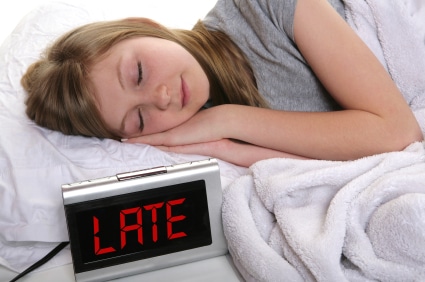
Sleep and Weight Gain: Sleeping Late Puts You at Risk for Obesity
Researchers at the Northwestern University Feinberg School of Medicine monitored the sleep habits, eating patterns and body weights of more than 50 healthy young and middle-aged adults. Some of these individuals were late sleepers, while others had more typical sleep schedules, going to bed around midnight or earlier and getting up at around 8:00 A.M. The late sleepers in this study would typically stay up until the wee hours of the morning and rise at around 10:45 A.M.
What did they find? Sleeping late, even if you get enough sleep, has its pitfalls. In this study, those who regularly went to bed late and woke up later consumed an average of 250 more calories a day. They were also more likely to make unhealthy food choices and limit the number of fruits and vegetables they ate. To make matters worse, they drank more sugary soft drinks. Not surprisingly, late snoozers also had higher BMIs.
The Disadvantages of Sleeping Late
The reason people who stay up late and rise later in the day tend to put on more weight isn’t clear, but researchers believe circadian rhythms play a role. Circadian rhythms are the internal cycles that tell your body when it should be awake and active and when it should be sleeping.
Circadian rhythms also play a role in establishing eating patterns, possibly by influencing brain chemicals that control appetite and by its effects on metabolism. When you expose your eyes to light at a time your body expects darkness, it throws off your natural rhythms. This can lead to increased food consumption and a metabolic slowdown.
Of course, food choices play a role too. Some people who eat their meals late at night have less access to healthy foods and opt for fast food and take-out. They’re also less likely to eat a healthy breakfast in the morning since they wake up late. Some studies show that people who skip breakfast are more prone to weight gain.
Sleep and Weight Gain: What Does This Mean?
This study adds to the growing body of evidence that sleep plays a role in weight control. People who don’t get enough sleep, regardless of when they go to bed and wake up, are more likely to put on weight.
One of the best steps you can take for weight control and for your overall health is to sleep between 7 and 8 hours a night. This amount of sleep seems to be best for appetite control and for keeping cortisol levels low Cortisol is a hormone that’s increased with stress and lack of sleep. It contributes to belly fat and muscle breakdown.
The Bottom Line?
Early to bed and early to rise not only makes you healthy, wealthy and wise, but it may also help to keep your weight under control too. When and how you sleep affects how much you eat and how your body burns fat. Get to bed on time whenever you can, and stay there for at least 7 hours.
References:
Science Daily. “Night Owls at Risk for Weight Gain and Bad Diet”
WebMD. “Are You Sleeping Enough — or Too Much?”
Related Articles By Cathe:
4 Ways Lack of Sleep Increases the Risk of Weight Gain
4 Ways Lack of Sleep Makes It Hard to Lose Belly Fat
Why Lack of Sleep is Bad for Your Heart
Does Lack Of Sleep Increase the Risk of Training Injuries?
How Does Lack of Sleep Affect Your Metabolism?
Sleep and Health: It’s Not Just the Amount of Sleep but the Amount of Deep Sleep

